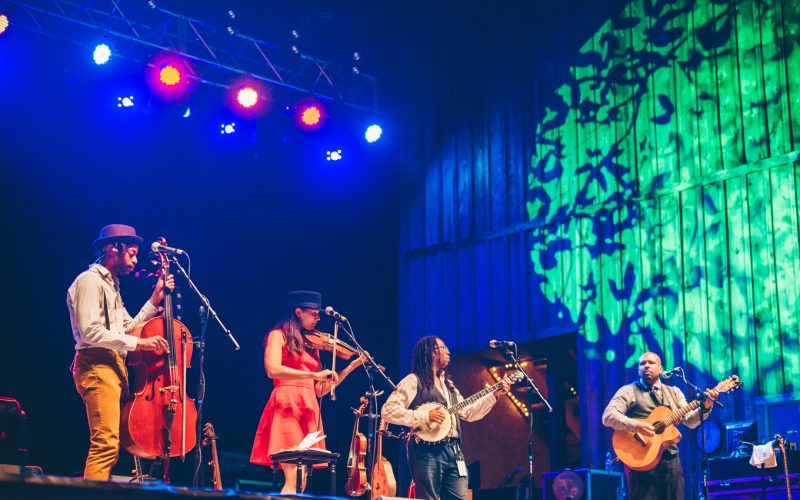
Photo by Ironside Photography The Carolina Drops perform with a modern acoustic mix of folk, jazz, blues and country to make for an engaging and electrifying set.
At a festival of bluegrass and folk music, by far one of the most impressive performances came from The Carolina Chocolate Drops and their vast knowledge of all things folk.
The band has been seeing a lot of success in the aftermath of winning a Grammy for best folk album for “Genuine Negro Jig.” The current lineup consists of a world-class multi-instrumentalist four piece of Rhiannon Giddens, Hubby Jenkins, Rowan Corbett and Malcom Parson.
Their Friday night headlining set was truly a roots music performance, inducing trance-like vibes with their originals like “Snowden’s Jig.” Despite being strictly acoustic, their performance was electrifying.
During the performance, Jenkins and Giddens took on both the roles of musicians/entertainers and history teachers. Before each folk song, they enlightened the crowd on the history of the song and instruments used and how it was written, with Jenkins always recommending the crowd to “Google it” to verify what he was saying on stage. It was clear how well-read and researched the band was, making clear their mission to spread their knowledge. This made for an educationally adventurous kind of live music experience.
Before their set Friday night, we were able to catch the group backstage for a Q&A:
TFW: So this is you guys’ first time playing Harvest Fest. Have you guys played through Arkansas often?
Giddens: Not often, the band has played through here a couple times. We’ve played Wakarusa, and we’ve played a couple different festivals in the state.
TFW: Evidenced by the popularity of Harvest Fest, bluegrass and folk music is pretty popular in this area. With playing tonight in this Ozark forest setting, do you all get a kind of connection playing your style of music here?
Giddens: Y’know I think we are more aware of how widespread old-time music is and how it differs from region to region. Y’know music in the Midwest is different from music in the South and there’s always different fill styles. So every time we come to a place where there is already old-time music it’s always great because we can always tell because the crowd is kinda primed for it.
TFW: I’ve been interested in musicians who dedicate their craft to pursuing old-time roots music styles. For you guys when you’re playing and writing that style of music, does it ever evoke a sort of — for lack of a better phrase — feel like going back in time in a time machine and reliving the music of older times?
Jenkins: I mean black people can’t go in time machines (laughs), it’s really just like music that we felt a connection to and music that has roots for us. For me personally, it was a big thing to find like “Oh, the banjo is a black instrument and oh there was tons of black string bands. Oh this is like a history of music that no one ever talks about or hears about.” So it’s not so much going back in time but it’s just like taking all that stuff that’s there and showing it to people and bringing it here and connecting with it and putting a voice to some of those people that never had a voice and all that kind of stuff. Because it’s us and because we have the Internet and iPhones, it becomes modern and contemporary.
Corbett: That’s what I was going to say. Particularly, we sort of try to keep it alive rather than it’s a set piece like a museum thing. We add our influences to it and try to keep it alive and breathing instead of something you dust off and show to people every once in a while.
TFW: I’m curious to know, in your experience, what does the word “folk” mean to you today?
Jenkins: I guess essentially folk music is people’s music. Music that had a purpose, which is what we do. We could be a folk band some of the time. Then the ’60s and ’70s come around and folk becomes its own genre. People that were writing songs were just writing songs, and now they’re singer/songwriters. I guess in the last 10 years it’s evolved into Americana or whatever and it tends to be acoustic as well. It changed. I was debating this with some friends back in New York. Some of the videos you see on YouTube could be a form of folk music. It’s kinda like “Let’s do our own versions of Rhiannon Giddens singing ‘Daughter’s Lament’.” Or people playing “Fuck You” with ukeleles and stuff and sharing it with each other and stuff. I think it’s a hard thing to define.
Giddens: I think the definition changes every generation. Folk music was not necessarily commercial music. Then you had the commercial folk burst of the ’60s and it became a commodity and thing to sell, then you go “is that folk music or is that commercial music?” It depends on who you ask.
TFW: The Carolina Chocolate Drops have gone through a lot of different band members. How do you keep the integrity of the Carolina Chocolate Drops together as you evolve?
Giddens: That’s a good question, and I’m the only original member left. It’s something I’ve thought about a lot. The nice thing is it’s been a gradual process. When Justin Robinson left we started having this conversation, and that’s when Hubby came in. We’d ask what is it that makes the Chocolate Drops unique, what about the sound that people really like, what does this band do? Through each iteration we’ve really been able to refine what that is. Each person has come in and have brought something different. They leave, but what they brought stays in the DNA of the band. The most important thing is it’s a band, and it’s never about me.



